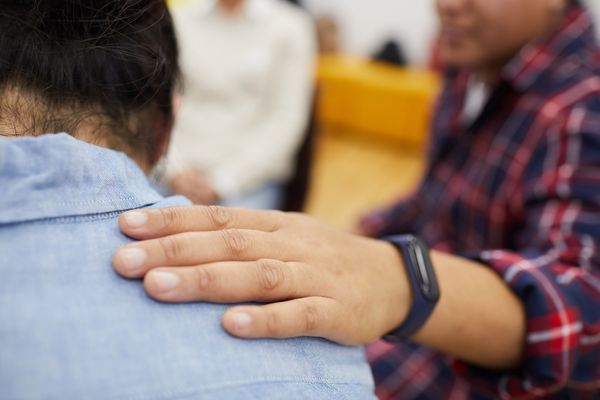Alcoholics Anonymous (AA), Narcotics Anonymous (NA), and Cocaine Anonymous (CA) are non-professional addiction recovery meeting groups that have been around for decades.
AA is the oldest, founded in the 1930s as a safe space for people recovering from alcohol abuse. In the meetings, people ready to quit drinking gathered to share their experiences in open discussions. Over time, The 12-Step Program created for AA became popular, and other organizations adopted it for other substances, such as cocaine and narcotics.
Attending support group meetings is a huge part of addiction recovery. It’s said that participation in these groups can bring tremendous benefits, including long-lasting recovery.
1. Offers Ongoing Support And Accountability
Attending support group meetings means being surrounded by a group of people who have gone or are going through similar struggles as us. Feeling heard and understood helps create a sense of community. At the same time, being part of a community helps us feel like we belong, contributing to a sense of safety and security.
In addition to an overall sense of support and community, support groups may help participants develop personal accountability by interacting with others in similar circumstances.
Seeing how others have dealt with the consequences of their addiction gives attendants context on how to manage life as a recovering addict. It helps them understand how to enforce personal accountability for their actions and the benefits of doing this.
2. Gives Participants Structure And Routine
Structure and routine are fundamental factors of success in addiction recovery. Boredom and a lack of a consistent day-to-day routine can significantly trigger cravings and increase the risk of relapse.
Life during recovery can be chaotic, unbalanced, and unpredictable. One of the best ways to set the foundation for successful recovery is to establish and stick to a daily structure. This is why many rehab programs focus on strict routines. This helps infuse a sense of organization in a life that can be otherwise very disorganized.
Something as seemingly simple as going to bed at the same time every day and meditating daily can create a sense of productivity conducive to recovery. Regularly attending group meetings can be a form of structure, too, or at least become one of the pillars that support an addiction-free future.
3. Helps Participants Expand Their Coping Skills
Coping skills are the strategies people use to reduce psychological stress. In addiction recovery, developing coping skills provides multiple benefits, including identifying triggers for cravings and learning how to avoid thought patterns associated with drug use.
Group meetings allow members to exchange recovery-oriented coping strategies with each other. More than textbook knowledge, this way, they can learn from each other as they explore the triggers that put them at higher risk of relapsing and the methods they use to alleviate them.
Different events trigger different people. By listening to the experiences of others and how they handle triggers, attendees expand their coping skills.
4. Offers Spiritual And Emotional Support
Social support and healthy relationships are key elements of the recovery process. When you have a strong emotional support system, it can help:
- Prevent feelings of social isolation that could lead to relapse.
- Bridge the vulnerable period between stopping substance use and developing coping skills that help people get through life without using substances.
- Receive encouragement from others who have been down a similar path and who personally understand your struggles.
Support groups like AA, NA, and CA provide a space where people can express their feelings about recovery and listen to the perspectives of others who are going or already went through that process.
Additionally, the 12 Steps are highly spiritual by nature. The spirituality of their message may help those in recovery to see their process as something larger than themselves as individuals. This may help them find purpose and meaning in their recovery, motivating them to stay on course.
5. Promotes Long-Term Recovery
Hard stats on success rates for support groups are hard to come by, and different sources provide very different numbers. The anonymous nature of these groups makes it difficult to get stats. Still, research shows that a combination of support groups with other forms of treatment can be highly effective.
Some research shows that those who participated in formal medical treatment and support groups were more likely to stay abstinent after one and three years than those who only entered formal treatment and those who only used support groups.
This shows that group meetings can be a legitimate source of recovery when integrated into a larger recovery plan. Increasing the likelihood of staying abstinent reduces the risk of relapse and improves overall well-being.
Another study found that higher levels of attendance to AA are related to higher rates of abstinence and that prior AA attendance is predictive of subsequent abstinence. The support provided by AA and all other groups spawned from its methods is proven to be effective.
AA, NA, & CA Can Be A Legitimate Source Of Recovery
Given these benefits and scientific evidence of the effectiveness of participation in support groups like AA, NA, and CA, it should be clear that integrating them into a recovery program can be a great way to strengthen coping habits and form stronger relationships with those around you.
Cocaine and alcohol are among some of the most socially accepted, yet addictive chemical substance around. They are found in clubs, bars, beyond and are often used together. If you struggle with alcohol and cocaine use, or any substance use, seeking treatment as soon as possible is essential. Once you do, attending support groups can be great for expanding coping skills, enjoying the benefits of social support, and developing productive structures to guide everyday life during recovery.
Talk to an addiction recovery specialist today about the right treatment program. They can also help you locate support group meetings in your area.
